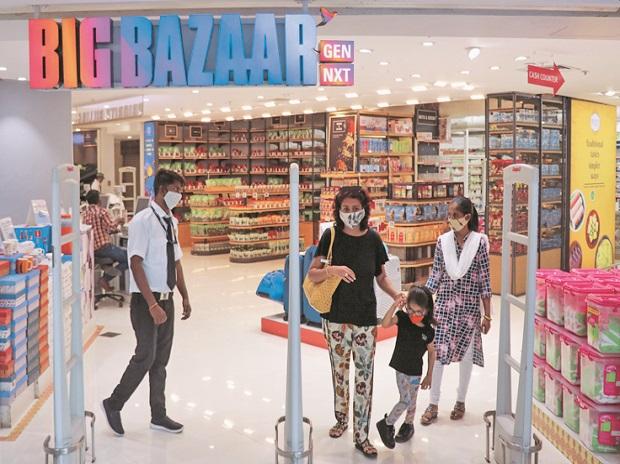[ad_1]
Reliance Industries (RIL) and a joint venture of Adani Group with Flemingo group are among 15 entities that submitted expressions of interest (EoIs) for Future Retail.
Future retail is currently undergoing insolvency resolution.
Here’s all you need to know about Future Retail, Amazon’s legal battle with Reliance:
Reliance Retail Ventures, a Reliance Industries subsidiary had announced its plan to acquire the retail, wholesale, logistics, and warehousing business of Future Group for Rs 24,713 crore in August 2020.
Following this, the US e-commerce giant Amazon, an investor in one of the Future Group holding companies, opposed the deal over an alleged breach of shareholder contract.
Since the deal was announced, Reliance provided financial help to Future Group. However, in February, Reliance closed more than 950 Future Retail stores as the latter defaulted on rent payments for these locations and started its own stores under new brands at the same locations. Big Bazaar was rebranded Smart Bazaar, Central mall turned Centro, and Brand Factory became Fashion Factory.
In April, Reliance called off the deal after extending the deadline thrice.
RIL has also claimed around Rs 5,300 crore as money owed by the Future Group flagship, in its notice to the resolution professional.
What is Future Retail?
One of the most prominent players in the Indian retail market, Future Retail Limited (FRL) is a retailing company selling a range of household and consumer products through departmental store facilities under various formats. It primarily deals in the business of multi-brand retail trade. With access to approximately 20 compact hypermarket Easyday stores and over 210 supermarket Easyday stores, the company operates across formats like Big Bazaar, Food Bazaar, FBB, Food Hall, and Easyday.
But since February 2020, the company’s business operation started facing problems, and the Future Retail share price fell from Rs 377.10 on February 13, 2020, to Rs 77.60 (on February 3, 2021).
The company was unable to pay off its debt, and ultimately Kishore Biyani (the founder and CEO of the future group) had to sell the company to Reliance Retail. However, even this deal with Reliance is now facing problems from Amazon.
The rise and fall of Future Retail
In 1997, Kishore Biyani entered the retail business by launching the first Pantaloons outlet in Kolkata. Biyani, who reaped the fruit of the 1991 liberalisation, was able to capture the market. In 2001, he diversified his business and started Big Bazaar, and launched a number of stores across India.
Biyani then opened a series of stores such as supermarkets, electronics stores, retail stores selling furniture, apparel brands, and multi-brand retail chains and started acquiring various grocery markets. He went on to add multiple brands and labels such as FBB, Central, Home town, and so on. However, many stores were hived off due to high pressure on the company’s finances. In 2007, Biyani further diversified into Future Generali Indian Insurance.
In 2008, the company coped with the global economic crisis, by massively increasing its spending and borrowing to retain market share.
In 2011, the UPA government opened the retail market for global players like Walmart, thus bringing competition to FRL.
The company’s debt increased to a glaring cost of Rs 12,778 crore in 2019, and all the promoters shares were pledged to the lenders.
The Covid-19 pandemic made it worse for the company as it had to pay an interest of Rs 100 crore on its foreign bonds on August 24, 2020, to avoid defaulting.
In August 2020, Reliance Retail announced its plan to buy the retail and wholesale business and the logistics and warehousing business from the Future Group for Rs 24,713 crores.
Too much diversification and constant restructuring led to the fall of Kishore Biyani’s FRL.
The rise of Amazon Retail, Amazon Pantry, and Walmart buying stakes in Flipkart, came as major blows to FRL.
Till the time the promoters of Future Group tried to cope with challenges from them through Big bazaar Direct Reliance Retail, Spencer’s, Tata Star Bazaar had grown their retail franchise, which further reduced the market share of Future Group.
Amazon vs Reliance
Reliance Retail signed an agreement in August 2020, to buy the retail and wholesale business and the logistics and warehousing business from the Future Group for Rs 24,713 crores.
Amazon’s objection to Future-Reliance Deal
Amazon made an investment in Future Coupons wherein Amazon bought a 49 per cent stake in 2019. This stake in Future Coupons translated into a 3.5 per cent stake in Future Retail. Amazon in its objection claimed that the deal came with a clause that prevented Future Group from selling off its listed entities without Amazon’s consent with a list of investors, which mentioned Mukesh Ambani’s name.
[ad_2]
Source link




